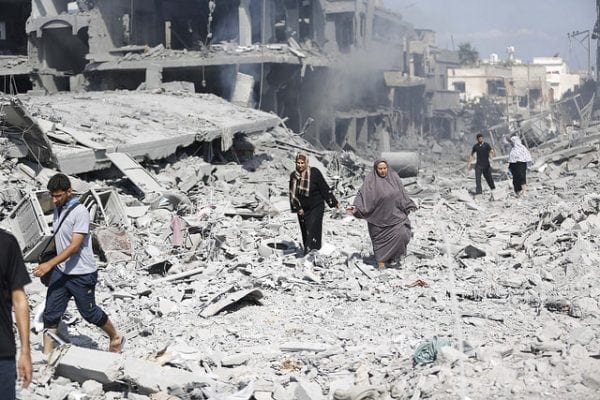Marking two years since the brutal Israeli assault that killed more than 2,200 Palestinians, #GazaLives tells the stories of Palestinians living there, in their own words.
=By= Anonymous, Shuja’iyya

Destruction in Gaza July 27, 2014. Photo by Oxfam / flickr.
It is a brutal enforcement replete with restrictions of all the necessities of life (including fresh water), and periodic flurries of devastating military action, which I believe (in part) is to threaten the rest of the Muslim world (particularly Iran) with its show of military might and complete lack of mercy. One such brutal demonstration was the bombardment a little over two years ago which left 2200 Palestinians dead.
I am a mother of eight children.
Their father died a year before the assault of 2014. I had barely recovered from mourning my husband when the war came to destroy what was left of my sanity.
When the war erupted, we thought it would last one or two weeks, but it continued for 51 days. The war targeted the entire Gaza Strip leaving no single safe place.
For the eastern parts of Gaza, the situation was the worst.
After tanks and planes shelled everything in sight, including houses, trees, streets and entire families, Gaza’s infrastructure, of water, sewage and electricity, was destroyed.
After a week of war, my children had a brush with death… It was the middle of Ramadan, and we couldn’t sleep because of the overwhelming noise of missiles and tanks.
Around midnight, most of the residents of Shuja’iyya decided to evacuate the area as they expected a very tough night. They ran, barefoot, in their night gowns, carrying nothing other than their children.
At exactly 1am, the air and land shelling intensified to the extent that I and the other families who had stayed in the area had to escape.
My children were terrified. I cannot describe the horrors I saw as people were crawling to escape and the shelling was chasing us, hitting some who were killed.
If you were slow to run, death would be your certain destiny.
The only thing we saw were the ambulances, and some private cars, carrying the scattered corpses, piled on top of each other.
To this day I cannot forget that moment when I saw around 8 dismembered corpses, faces disfigured, blood dripping from their bodies.
We walked aimlessly to nowhere. Some people found shelter in schools; others went to their relatives. Some ended up sheltering in hospitals.
My family and I made our way from the Shuja’iyya neighborhood, moving westward. We turned to look at the place behind us. The scene was horrifying, full of houses collapsing one after the other and widespread damage everywhere. Not as single soul remained.
All the residents fled, often leaving behind the corpses of their beloved ones.
We decided to go to our relatives in Shiek Ijleen. We had walked a long distance from east to west. To our surprise, there were hundreds of other people in that house.
We had no choice but to stay. My father and siblings lived also in Shuja’iyya, but they had fled with others to dispersed areas. I could not find them or even learn their fate.
One of my children was almost killed several times as he tried to get us basic supplies. Because of the overcrowding, we always lacked water and bread.
On the last day of the war, my father was killed. This was a great loss for me.
I decided to go back to Shuja’iyya, but could not get there because of the heavy shelling.
I returned to my relatives’ house. We waited for the war to end, but it never did.
Staying in a house with 200 people and no water or food was very difficult. The children were screaming. There was no electricity. The elders amongst us were terrified.
I decided to go back with my children as soon as a ceasefire was declared. And so I did.
I returned to Shuja’iyya and could not recognize it.
I saw blood and ruins and the smell of rotten corpses. Our house was partially demolished, still standing, but without windows or doors. Water and electricity networks were damaged.
I stayed and I will not leave after the ceasefire ends. I will never leave.
The views expressed in this article are those of the author.
Note to Commenters
Due to severe hacking attacks in the recent past that brought our site down for up to 11 days with considerable loss of circulation, we exercise extreme caution in the comments we publish, as the comment box has been one of the main arteries to inject malicious code. Because of that comments may not appear immediately, but rest assured that if you are a legitimate commenter your opinion will be published within 24 hours. If your comment fails to appear, and you wish to reach us directly, send us a mail at: editor@greanvillepost.com
We apologize for this inconvenience.
 Nauseated by the
Nauseated by the
vile corporate media?
Had enough of their lies, escapism,
omissions and relentless manipulation?
Send a donation to
The Greanville Post–or
But be sure to support YOUR media.
If you don’t, who will?